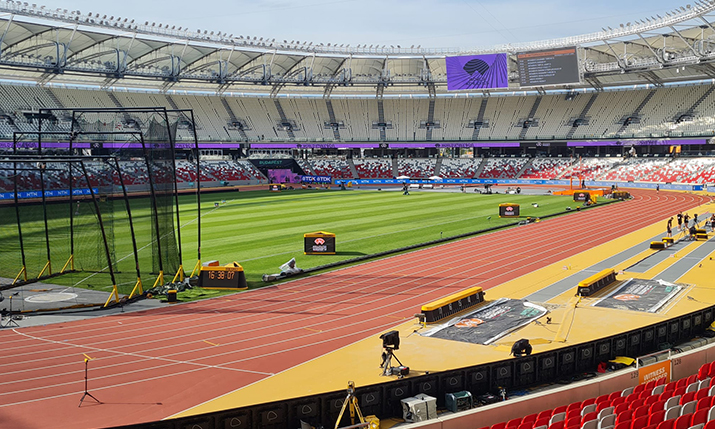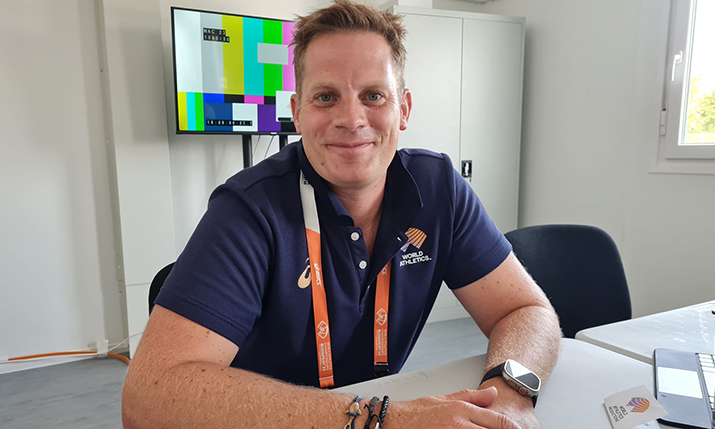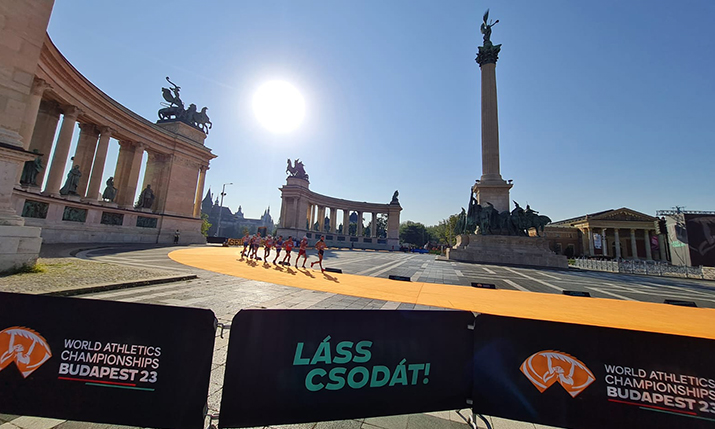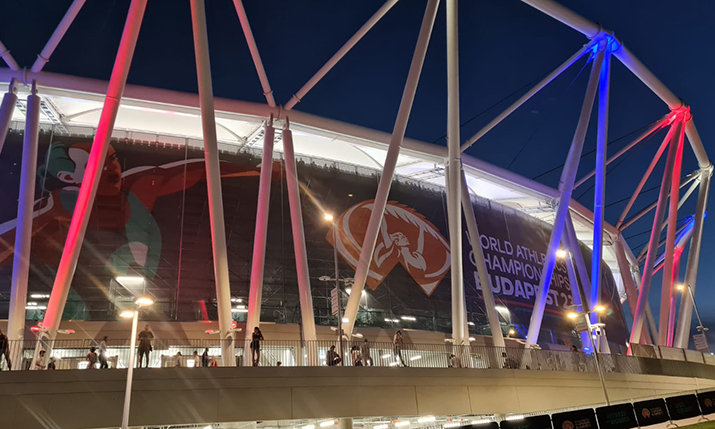Live from Budapest: Director of broadcast at World Athletics James Lord talks improving value for fans and rights holders

The World Athletic Championship 2023 was held from 19 to 27 August in Budapest
James Lord, director of broadcast at World Athletics, has been at World Athletics for six years, coming to the association from the England and Wales Cricket Board (ECB). He says he joined what was the IAAF and is now World Athletics because he wants to help grow it.
Speaking to SVG Europe in Budapest at the World Athletic Championships 2023, he explains: “My role is fundamentally split in half. The one half is media rights, so how we sell and manage all of our media rights around the world for all the World Athletic Series, with seven events held over a two year cycle. And then production as well and the relationship with ITN through our joint venture with ITN [World Athletics Productions]. That was one of the principal reasons I decided to join, because I wanted to spend more time on international distribution but also content production as well. So it’s an incredibly broad remit.”
The joint venture of World Athletic Productions was agreed initially in 2017 and came to life in 2018, with the first event under the brand in 2019 with the World Cross Country Championships in Aarhus, Denmark. That was swiftly followed by Doha for the World Championships.

James Lord, director of broadcast at World Athletics
Taking control
On World Athletic Productions, Lord says: “That was one of the main reasons I joined, genuinely. I think historically what was happening before the partnership was put in place was the responsibility for host broadcasting was very much left with the organising committee. So that was true in London ’17 and all events prior to that. I think [the LOC] inevitably have a slightly different perspective on production and content than maybe we at World Athletics do.
“For us it’s about improving the quality of the product and consistency from event to event to event, and delivering more value, whereas with an organising committee, of course events can often be very expensive to host, and sometimes it can be more of a race to the bottom line and do it as cheaply as possible. So the decision to take control and effectively bring production inhouse was for me a really smart move. When I first heard about it, it was a big draw for me to leave England Cricket, which was a big passion of mine, to come to athletics.”
“It’s making sure that live experience is great, and it’s changing and improving and it’s an entertaining product to watch, and that people understand the sport and demystifying the sport as well. But then giving people more opportunities to watch in different ways as well. I think we’ve got that balance really, really, really good here”
Through World Athletic Productions the association has been able to sit down and really question what it wants and how it wants that to be presented on screen, Lord says. “[The joint venture it] has allowed us to really spend time to look at the product and say, “how do we improve it?”. So I bracket my role into two simple areas, which is improving the quality of the output with the team here, and then getting more people to watch. If you boil it right down to the very basics, that’s what it’s all about.”
Yet he adds the goal of bringing more people to athletics is not an overnight fix. “It takes time. Athletics is a complicated sport. The World Championships is a big, big event. And particularly the people who don’t know the sport, it’s a lot to get your head around. So we think we’ve gone on a really long journey. You improve event to event, and you’re learning, they’re all different; the World Champs in Doha in ’19 was radically different to Oregon, and then Oregon was radically different to here. And I’m sure it’ll be very different in Tokyo in ’25 as well.
“But for us it’s really about making sure we’re just improving the product from top to bottom, whether that’s how the camera narratives are put together, graphics, and really the whole storytelling,” Lord continues. “And actually not just telling the story of the competition; it’s about [the athletes’] journey when they get off the bus and the journey into the call room, and the drama and the moments before they run out onto the track – of course telling the great stories that unfold on the track and the field – but also then what happens afterwards as well.”
The results so far are promising, Lord comments: “We’re seeing there’s just so much more demand for that content, and the more we do it, the more our rightsholders say, “we want more of it”. It’s funny that this is the first World Championships where they don’t just ask for more, but they’re expecting all that behind the scenes content; the cameras in the call room, cameras on the buggies coming over, that kind of ancillary additional content they’re craving. And it goes down really, really well.”
He adds: “It’s just a real obsession of ours to just improve the product, and taking production inhouse has allowed us to do that and not be focused solely on the cost. Because it’s a balance; it’s an expensive production, but you have to find the balance between cost and quality as well. I think we’re making huge strides in that area as well.”

Race walkers in the 35km competition sweat profusely in the morning sunshine in Hero’s Square, Budapest, at the World Athletic Championships 2023
Delivering value
As well as making sure that fans around the world see a continually enhanced product on screen, much of Lord’s focus is on delivering value to the World Athletics’ rightsholders. He explains: “So fundamentally we are handing the content over to our broadcast partners, whether that’s the BBC or TBS and NBC and so on. We know that there’s pressures on linear audiences; it’s difficult, it’s not easy. We know digital audiences are rising and linear audiences are going down steadily.
“But for me it’s about delivering more value both on and off screen to our rightsholders. I think I really do believe that the quality of the output here at the World Championships is really delivering on the screen, but then we’re delivering a lot more value to rightsholders off screen as well through digital content. We launched a content management system that we call our Digital Media Hub a couple of years ago, which is an online tool where we just pump tons and tons of content to our rightsholders; it’s added value. It’s a lot of content that they can put out on social, on their own digital channels, that still grows their audiences and delivers value for them.
“Because if you look at athletics, certainly the World Championships, we are lucky that we’ve got an event that still gets huge demand around the world. We’re distributing this to over 200 countries around the world, which is phenomenal, and the scheduling and the commitments we get around that are great, with 75% or so still on free to air networks, which is exactly what we want. But we know that they’re under more pressure than ever, so we have to give them more value on screen and off screen as well.
“I think we’re doing that,” he continues. “We see genuinely more digital output on our broadcast platforms than we ever have before. I think we’re finding that nice balance between delivering a superb live experience, but actually a really nice digital experience as well.”
He notes: “It’s making sure that live experience is great, and it’s changing and improving and it’s an entertaining product to watch, and that people understand the sport and demystifying the sport as well. But then giving people more opportunities to watch in different ways as well. I think we’ve got that balance really, really, really good here. So I’m really happy.
“In my world it’s all about content distribution. At the end of the day when our deals come up for renewal, people look to me to say we’ve got better deals, and that’s not just financially, but broadcast commitments around better scheduling and commitments on live coverage. All those things go to really the core of what we’re doing. So yes, it’s a long journey, but fundamentally that’s what it’s about as well.”

The National Athletics Centre was purpose built in the heart of Budapest especially to host the World Athletics Championships 2023
Archive programming
Next up World Athletics is looking more deeply into its extensive archives to create long form content. Says Lord of using archive material to generate additional material, “it’s on the horizon”.
He goes on: “It’s what we’re thinking about. I think one of the big benefits of managing production under the umbrella of World Athletics is we’re archiving more content now than we ever have done before. So from ’19 when the partnership started, we’ve archived ridiculous amounts of content. I mean, you should see the drive that gets full at the end of this thing, it’s just enormous!
“That’s very different to historically where we would’ve just probably archived the world feed or the highlights. Now we’re now really starting to think about what do we do with it? So we’ve got this Media Hub, but that’s not an archive platform, that’s a real time platform. But I’ve just hired someone in my team to really start thinking this, [including] how do we really monetise and distribute archive, because there’s a huge opportunity around that, particularly in World Championship and Olympic years. We get a lot of inbound queries, but one thing I want to spend more time on is more proactive sales as well. We know that we’ve got some phenomenal moments in the archives and I think we can do more with that.
“When it comes to long form programming, it’s funny, we keep talking about this, and in fact a member of my team keeps talking to me about whether we should consider feature films, long form documentaries. So it’s something we’re thinking of.”
Going mainstream
Just prior to the championships World Athletics signed a deal with Netflix, which was on site in Budapest creating a six part series for a multifaceted athletics documentary including the Diamond League, National Championships, and more.
Lord notes: “Athletics is 75% largely on traditional free to air networks. So then to have the opportunity to distribute content on a platform like Netflix globally to tell a story that we don’t do because it’s behind the scenes, actually that’s really, really quite exciting. So we really do have high hopes and high expectations [for the Netflix series].
“Fingers crossed it does a good job, and then hopefully we can use it to have more meaningful conversations with commercial partners and rightsholders longer term, and to try to do things slightly differently as well. So really excited about it.”
Yet he adds: “Is there an opportunity for us to do something more? Yes, without doubt, but I don’t want to do it just for the sake of doing it. I want to do it for the right reasons. I think our horizons need to be broader than just our events,” he says, referring to other athletics leagues.
Lord comments on creating more with archive material: “What we’re now really starting to think through is, how do you pull that together to keep that interest level going? And actually I don’t think there’s anything wrong in saying you have natural spikes [during the World Athletic Championship and Olympic years] because that’s always going to be the way; you must maximise those spikes. It’s about what you do in the middle. You’re never going to make that middle part as high as the spikes. I think that’s almost impossible. But maintaining a good, strong level of interest throughout is really important.
“So I think that’s where we’re going. But I think more collaboration with the wider sport is where I think the opportunity is.”

